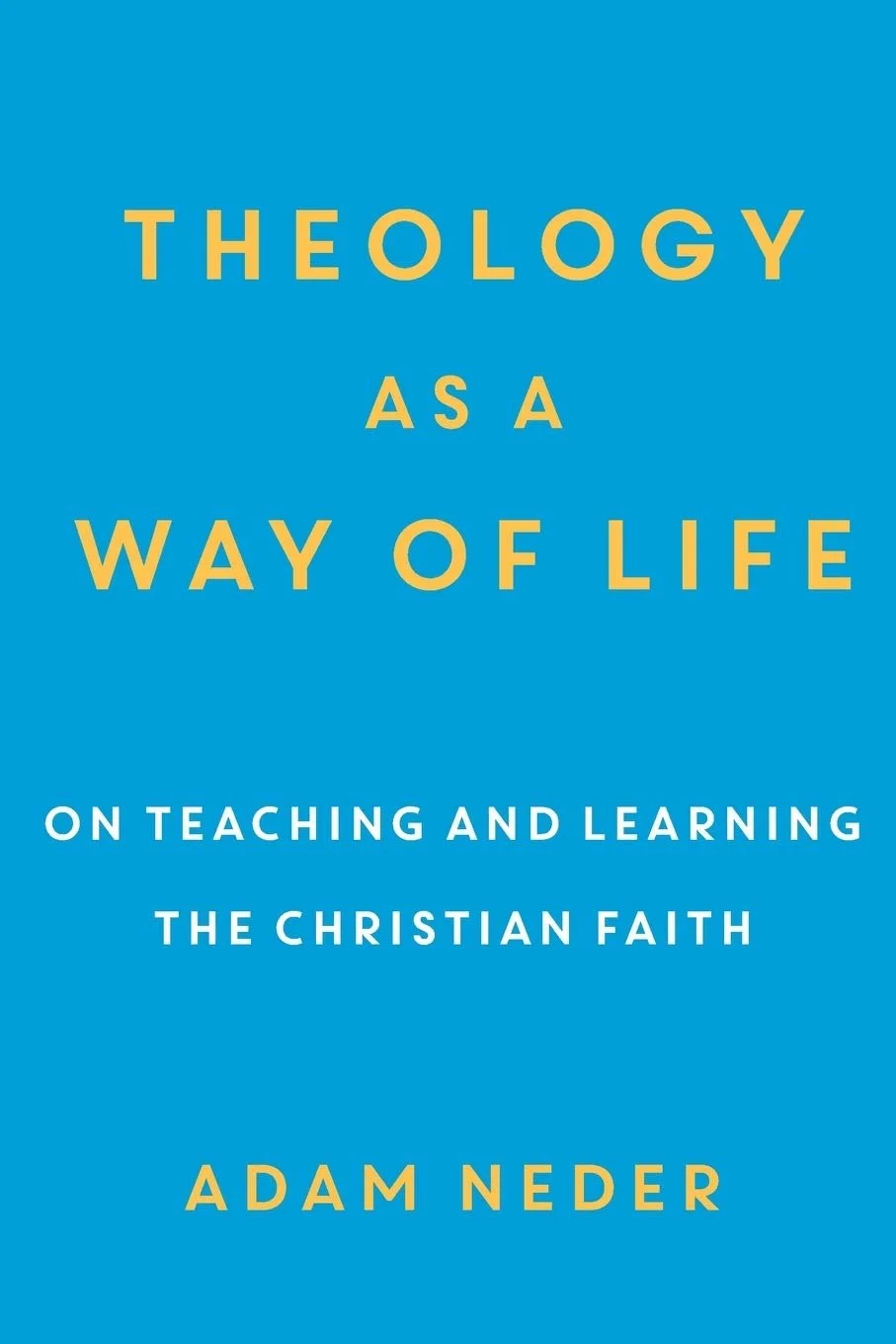The views expressed in this article are of the author only and do not necessarily represent those of the Center for Pastor Theologians.
Theology as a Way of Life: On Teaching and Learning Christian Faith
Adam Neder
Baker Academic (2019). 176 pp.
I had a theology professor at a Reformed seminary who reminded our class, “right thinking leads to right action” (orthodoxy leads to orthopraxy). St. Augustine’s De Doctrina Christiana (variously translated “On Christian Doctrine” or “On Christian Teaching”) was instructive on the role of doctrine in our faith formation, and the role of the teacher in that formative process as students are shaped towards the love of God. Whitworth University’s Bruner-Welch Professor of Theology Adam Neder writes in that tradition with this easily accessible volume for teachers and students of theology alike; this means anyone and everyone who engages the study of Scripture and Christian theology must read this book for its reminder that the teaching and study of theology is not just about cognitive engagement or finely tuned discourse of subjects concerning our Creator and the mystery of the triune God, as it is about the living encounter of the Lord with us in the heart and mind of Jesus Christ. And because of that reality, the teaching and study of theology requires love, humility, and a downright intentionality that what is at stake is our discipleship to the glory of God.
Neder is a Princeton theologian, having studied with the great Barthian scholar Bruce McCormack. He deftly puts us in conversation with Barth, Bonhoeffer, and Kierkegaard, and their collective writings on the essence of the Christian faith as a life lived as faithful witness to and for the Lord who redeems and reconciles.
The first chapter on “Identity” sets out to establish the core foundation for teacher and student alike: we are children of God, redeemed and reconciled in Jesus Christ, and fellow disciples of the Lord, which means teaching—whether in a formal classroom setting at a university or seminary, in the living room of congregants’ homes, in a confirmation class for teenagers, or from the pulpit—requires prayer so that we are anchored to the One who is our Teacher, namely the Spirit of the Lord. This is a necessary reminder that as teachers, we challenge students to wrestle with who the Lord is and how others have similarly grappled with the knowledge of God.
The second chapter on “knowledge” asserts that our pursuit of knowledge of God means God is knowable, and that such knowledge is grounded in the specificity of who God is in Jesus Christ. Our knowledge of God, distinguished from knowing things about God, is based on God’s intentional, decisive self-revelation in Jesus Christ as known through the witness of the Bible and attested to us by the Holy Spirit. This is all to say, Neder asserts, this humble confidence and confident humility helps us to avoid, on the one hand, reticence in the face of God’s mystery, or, on the other hand, that such knowledge has definite specification in the person of Jesus Christ. God’s self-revelation means that all of our knowledge and how and what the Church understands must be tested against the self-revelation of God in Christ.
The third chapter on “ethos” deals with the credibility of our witness as teachers. In other words, do we walk the talk? Circling back to the Spirit of Christ as the Teacher, we are to direct our students’ to God, less on ourselves and more on the One who is the subject and object of our study. What this also means is we know and acknowledge our limitations, not having the air of “knowing everything” (even with the misnamed theological degree, Master of Divinity or Master of Theology!).
The fourth chapter on “danger” highlights the reality that because the living God is the subject of theological study and teaching, and the living Lord is the One who enables us to know God, and who in God’s self knows us, the “danger” of our study and teaching is that God will surprise us at every turn, that God transforms us and conforms us to God’s will, and often disrupts and upends our assumptions, our agendas, and our very lives. The “danger” is in thinking that we have so much certainty that we have God figured out, or that the journey of faith is linear. Instead, true discipleship is risky and costly.
The final chapter on “conversation” emphasizes the need for teachers and students alike to have multiple conversation partners, to be attentive to and listen carefully to God speaking through Scriptures, and to engage broadly and deeply with theologians and historians. It also means asking the right questions and encouraging students to be curious, to stand at the margins, to critique assumptions, and to walk in risky faith.
This volume and the subject matter is a gift and a call. Teaching and the subject matter are gifts because God enables, empowers, and inspires the teaching of who God is and what God desires of our lives. They are a call because, at the outset and in the end, teaching about God and encountering the living Lord calls forth a response to what is taught and learned and received: this is no less than a call to love the Lord.
Neal D. Presa is an ordained minister in the Presbyterian Church (USA) and the interim associate vice president for admissions and a faculty member at New Brunswick Theological Seminary in New Jersey. He also helps lead the World Council of Churches Central and Executive Committees. He’s the author of numerous books and is a member of the St. Augustine Fellowship of the Center for Pastor Theologians.




